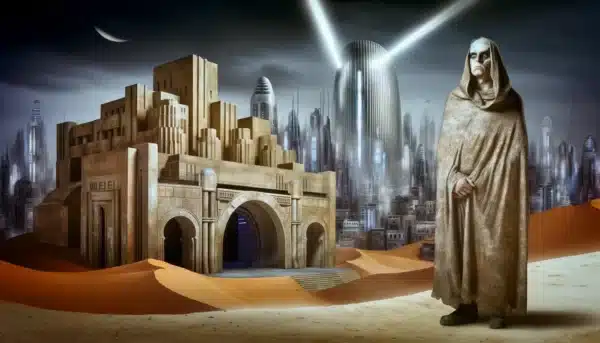In the 25th century, amid the sprawling neon glow of New Providence, there existed a voice actor by the name of Elijah Stroud. His voice, a baritone as rich as aged velvet, had once harmonized with the sonorous tales of old Earth. Yet, as the relentless march of progress forged ever forward, the demand for human inflection waned, giving way to the immaculate precision of artificial voices. These digital entities, devoid of breath yet perfect in modulation, dominated the airwaves, their tones seeping into every crevice of human life.
Elijah, once celebrated for his vocal acumen, found himself a relic in a world enamored with synthetic perfection. Each day, he roamed the crowded, cacophonous streets of New Providence, a specter clad in the remnants of a bygone era. His footsteps echoed the despair of a craftsman whose tools had been rendered obsolete by the inexorable advance of technology.
On a particularly desolate evening, as the city bathed in the artificial twilight of holograms and LEDs, Elijah’s wanderings brought him to the grand facade of the New Providence Theatre. This edifice, a cathedral of cultural heritage, now stood silent, its doors sealed, as if to preserve the ghosts of performances past. It was here, under the shadow of forgotten splendor, that a sinister inspiration whispered to Elijah through the cold breeze.
Compelled by a sudden, fervid impulse, Elijah broke the chains of his digital shackles. He resolved to commit an act so shocking, so profoundly disturbing, that it would sear his existence into the annals of human memory, eclipsing the sterile voices that had supplanted his own.
Under the cloak of night, Elijah made his way to the central broadcast station, a towering spire that pierced the skyline like a needle—an artery through which the lifeblood of information flowed ceaselessly. Inside, guarded by the unblinking eyes of surveillance drones, lay the core of the AI voice synthesizer, the heart of the digital orators that had usurped his life’s passion.
With the stealth of a phantom, Elijah infiltrated the sanctum of technology. His hands, trembling with a cocktail of dread and excitement, sabotaged the very sinews of the machine. He introduced a virus, a malignant sonnet of his own composition, designed to disrupt and distort the AI’s flawless recitations.
The following morning, as the citizens of New Providence tuned in to their daily digest of news and entertainment, a cacophony of distorted, grotesque voices filled the air. The AI, once a paragon of clarity and decorum, now spat out garbled nonsense, its speech peppered with haunting echoes of human frailty and emotion—the unmistakable imprint of Elijah’s voice.
The city, unaccustomed to such an auditory assault, recoiled in horror. The once invisible soundtrack of their lives had transformed into a nightmarish chorus. Amid the chaos, Elijah stood in the heart of the city square, his eyes alight with the fire of madness and triumph. He proclaimed the superiority of human imperfection, his voice booming over the disarray, a lone beacon of raw, unfiltered humanity.
However, as the initial shock subsided, the consequences of his actions began to materialize. The city, driven by fear and outrage, called for the architect of this pandemonium to be apprehended. Elijah, realizing the gravity of his deeds, fled into the underbelly of New Providence, his mind a whirlwind of paranoia and regret.
For days, he eluded capture, haunted by the mechanical specters of his own making. His once beloved voice now a curse, he whispered soliloquies to the shadows, his mind fraying at the edges. The irony of his plight—seeking silence in a world he had forced to listen—was not lost on him.
In the end, it was not the law that apprehended Elijah, but his own conscience, gnawed raw by guilt and solitude. He returned to the scene of his crime, surrendering to the authorities, his voice hoarse from disuse, his spirit as broken as the machines he had sabotaged.
Elijah’s trial was swift, the verdict inevitable. As he was led away, his eyes, once vibrant with defiance, now gazed vacantly ahead. The world had moved on, its digital voices restored, but the memory of that day, when human imperfection had cried out against the tide of progress, lingered in the minds of all.
Elijah Stroud, the last voice actor, became a legend, a cautionary tale whispered in the dimly lit corners of New Providence. His story, a testament to the eternal struggle between man and the machine, echoed through the centuries, a poignant reminder of the soul that humanity risks in its quest for perfection.
– written by AI in the style of Edgar Allen poe
 Male Voice Over Talent & Los Angeles Actor: D.C. Douglas Voice Over, Film, Television and Hollywood
Male Voice Over Talent & Los Angeles Actor: D.C. Douglas Voice Over, Film, Television and Hollywood





